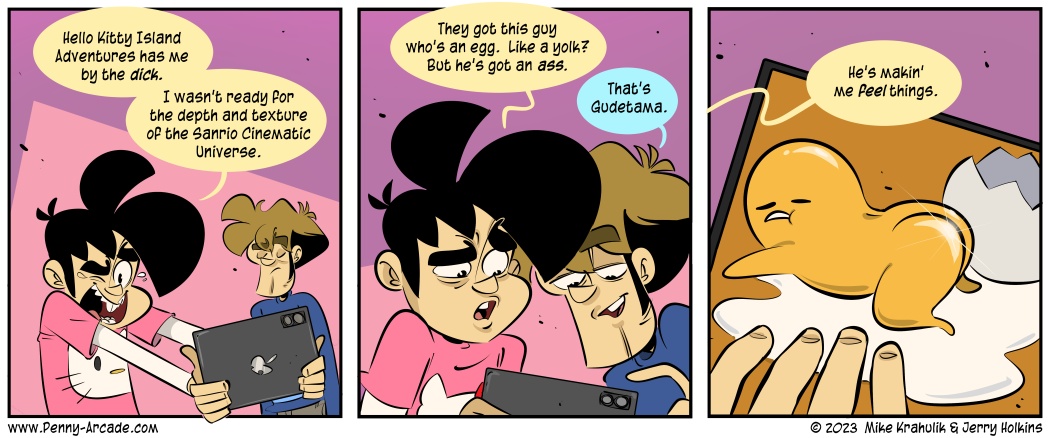Having problems registering on Coin Return? Please email support@coin-return.org, and include your PA username and PIN.
Penny Arcade - Comic - Good Etama
Dog Registered User, Administrator, Vanilla Staff admin
Registered User, Administrator, Vanilla Staff admin
 Registered User, Administrator, Vanilla Staff admin
Registered User, Administrator, Vanilla Staff admin

Penny Arcade - Comic - Good Etama
Videogaming-related online strip by Mike Krahulik and Jerry Holkins. Includes news and commentary.
+3

Posts
-Tycho Brahe
I mean, it all comes down to if somebody decides to sue and if they decide to fight it. But if I recall correctly, the reason why the Strawberry Shortcake comics wasn't ok was "because they were using Strawberry Shortcake to parody another IP (American McGee's Alice In Wonderland)". If they were just parodying Strawberry Shortcake it would have been ok (in theory). But I'm sure the lawyers could come up with a reason this isn't parody either.
Basically the reason Weird Al always gets permissions to write his songs, which typically aren't exactly a "parody" of the original (e.g. "Party in the CIA").
https://www.tcamtoday.com/2023/laugh-it-off-a-guide-to-parody-under-us-trademark-law/
https://corporate.findlaw.com/intellectual-property/parody-fair-use-or-copyright-infringement.html
https://corporate.findlaw.com/intellectual-property/parody-use-of-trademarks.html
https://copyrightalliance.org/faqs/parody-considered-fair-use-satire-isnt/
https://casetext.com/case/northland-family-planning-clinic-inc-v-ctr-for-bioethical-reform
Sorry, don't mean to bury you in references, but it's something I've looked up before.
It's possible PA could have won a court battle. From everything I've read, it's never 100% certain how things will go. That 2 Live Crew case took three trials with different outcomes before SCOTUS made the final ruling. But in general, the cases I've seen decided are pretty clear on what constitutes parody, even if they don't always fully apply the logic to a particular case.
Today's PA strip would definitely be parody, as it's commenting on the sexiness of Gudetama with a drawing of Gudetama.
I also feel compelled to mention that some of Weird Al's songs are clearly parodies (commenting on the original), like Smells Like Nirvana. There's just a whole lot more that are not, or are only if you squint super hard.
@cliffisboring
I posed all the Gudetama's in the game and on every butt shot I increased the size of his rump 20% specifically to awaken dormant feelings in people.
-Tycho Brahe
The 2 Live Crew case defined the 4 factor test that courts use, but because it's kind of a mess to navigate (it took multiple lawsuits in multiple jurisdictions and several trips to the supreme court to resolve - the case ended up generating a *ton* of Fair Use precedent) the various Dr. Seuss cases are probably a better set of examples. They've had a dozen or so, with an even mix of wins and losses, but their "big three" are Pengin Books, ComicMix, and Lombardo.
Seuss vs. Penguin Books: Penguin Books published a book that depicted The Cat in the Hat as OJ Simpson in his criminal trial on it's cover. It borrowed only a single page of art and a character name for the title and not the work, which didn't pursue the metaphor at all in the book. It was found to be infringing because the only commentary was on the Simpson trial and not Dr. Seuss, and that the infringing material was only used for attention and not content.
Seuss vs. ComicMix: ComicMix published a Star Trek parody using Dr. Seuss characters and style. ComicMix was also sued by CBS for this, and the two cases together paint the picture well. The work was found not to infringe on CBS's rights as it made extensive commentary on Star Trek specifically and the genre in general, but it was found to be infringing on Dr. Seuss because it did not comment upon the works it borrowed characters, art, and style from.
Seuss vs. Lombardo: This one Seuss lost. This work involved characters and setting from How the Grinch Stole Christmas, as the residents of Whoville faced serious real world problems with the same unsettling cheerfulness as stolen Christmas decorations. The work was found to comment heavily on the borrowed material and thus not infringing.
The Strawberry Shortcake comic would be closest to ComicMix (infringing), while this one would be closest to Lombardo (not infringing).